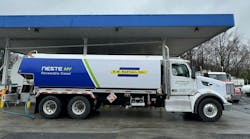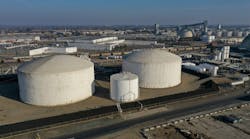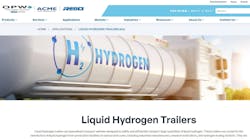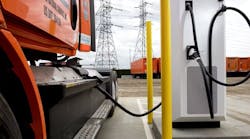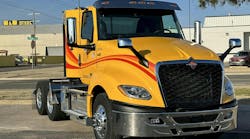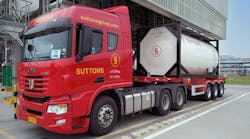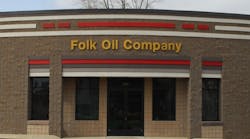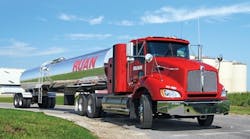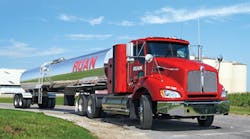ON AUGUST 14, the first four truck-tractors in a 42-truck order were delivered to Fair Oaks Farms near Fair Oaks, Indiana. Fueled with methane from the dairy farm, this milk hauling fleet operation is being described as the largest renewable compressed natural gas (CNG) project of its kind in the United States.
Fair Oaks Farms and its partners expect the CNG fleet and its fueling infrastructure (specifically two CNG fueling stations) to be fully operational by the end of September, at the latest. Project partners include Ruan Transportation Management Systems, PacLease, Clean Energy Fuel Corp, and New Frontier Holdings (a renewable energy investment firm). The dairy operation also received substantial state and federal support.
While the natural-gas-fueled tractors are significant, the way they will be used is just as noteworthy. Plans are to run the 42 tractors virtually around the clock ina milk-hauling relay operation designed to squeeze maximum productivity from the equipment.
Mark Stoermann, project manager for Fair Oaks Dairy Farm, calls it an exciting project. “We believe we are part of the answer to using renewable energy to reduce US dependence on imported oil,” he says. “We're employing proven technology to solve one of the United States' biggest economic problems. In addition, we're combining time-tested fleet management practices to achieve the highest possible productivity.”
Ben McLean, Ruan senior vice-president and chief information officer, adds that this large-scale CNG transportation solution is an important step in the US effort to create an increasingly sustainable supply chain. “We are optimistic that our country can produce more of our energy sources domestically, and we will continue to develop CNG transportation solutions across the nation,” he says.
Leading edge
Wayne T Ashley Jr, Ruan vice-president and region manager, New Mexico and Indiana Dairy and Bulk Food Transport Division, says: “We believe we are on the leading edge of a major change in milk hauling. We are thrilled to have the opportunity to partner with Fair Oaks Farms on this, and we are more than willing to do the sort of innovation that it will take to make this a successful venture. We know how to get the most utilization possible out of a milk transport fleet. This is not an experiment. It will be a successful venture.”
“We run 100 milk transports in New Mexico, and I can envision transitioning some or all of that fleet to natural gas in the future,” he adds. “This project is just another example of how Ruan adds value to our clients' supply chains through sustainable initiatives.”
The CNG milk hauling fleet started with a meeting a couple of years ago between John Ruan III, Ruan chairman, and Dr Mike McCloskey, owner and president of Fair Oaks Farms. They discussed the potential for using methane produced from dairy cow manure to fuel the trucks hauling milk to processing plants.
The two men already had a lengthy working relationship, and both were enthusiastic about the potential for natural gas as a vehicle fuel. McCloskey has dairy farm operations in New Mexico, and Ruan's trucking activities have been hauling milk for those farms for many years. McCloskey's dairy farms in New Mexico are part of the Continental Cooperative, which now manages transportation and distribution for Fair Oaks Farms.
Large operation
Twelve dairy farms (including four owned by McCloskey) in northwestern Indiana make up Fair Oaks Farms, a diversified marketing organization. Each dairy has a herd of approximately 3,000 milk cows. Fair Oaks Farms divisions include Windy Oaks Biofuels, which is leasing the 42 CNG fueled tractors and is operating four manure digesters that generate methane gas; and Renewable Dairy Fuels, which oversees the CNG refueling station near the main Fair Oaks Farms facility.
Fair Oaks Farms also has become well known regionally as a tourist attraction and popular field trip destination that promotes the importance of sustainable farming. Facility tours give visitors an opportunity to see cows being milked, calves being born, and artesian cheeses being produced.
The latest chapter in Fair Oaks Farms' sustainable farming story is the new CNG-fueled milk hauling fleet that is just commencing operations. “This is a major undertaking, and we are excited to be part of providing a model of innovation that can be reproduced in other parts of the country in the future,” McCloskey says.
To bring the CNG-fueled milk hauling fleet concept to life, McCloskey and his management team drew on a broad partnership. In addition to the corporate partners that helped assemble the transportation infrastructure, Fair Oaks Farms teamed up with the State of Indiana and the US Department of Energy.
Government grants
The project is supported by grants from the US Department of Energy's State Energy Program and Clean Cities Program, and the Indiana Office of Energy Development. Fair Oaks Farms also received cooperation and support from the Greater Indiana Clean Cities Coalition.
“Federal and state grants helped offset the higher cost of the CNG-fueled tractors and the cost of building two CNG filling stations,” Stoermann says. “At this point, it still takes incentives to justify the initial investment natural gas fueled vehicles. We have to do better than break-even. As the equipment costs come down, the incentives can go away.”
He explains that the CNG engines and other hardware substantially boosted the cost of the tractors. In addition, Fair Oaks Farms had to assemble its own refueling system, which cost approximately $2 million.
“That said, CNG is a good vehicle fuel for the right application, and we believe that our milk hauling operation is the right application,” Stoermann says. “To make it work, though, we have to get about 250,000 miles a year out of each tractor. We want the trucks to run virtually around the clock. After all, our cows produce milk around the clock.”
The objective is for the new CNG-fueled fleet to transport fifty-three 6,100-gallon loads of milk a day, 9.8 million gallons a month, and cumulatively 118 million gallons a year. While doing that in place of diesel-fueled vehicles, the CNG-fueled tractors will displace more than 2.2 million gallons of diesel. The CNG-fueled trucks are expected to lower emissions by 60% and also reduce the dairy's carbon footprint.
Tractor specs
Working with PacLease, Fair Oaks Farms managers agreed on a tractor specification that they believe will meet their need to handle an 80,000-lb gross combination weight and haul a maximum payload. They chose the Kenworth T440 daycab tractor with a nine-liter Cummins Westport ISL G engine rated at 320 horsepower, Allison 3000HS six-speed automatic transmission, and four CNG fuel tanks that hold the equivalent of 130 gallons of diesel. As spec'd the tractor has a range of almost 600 miles.
Low tare weight was a prime consideration, and the tractors weigh 10,025 pounds. Light weight components include Alcoa aluminum disc wheels, Meritor X-30 brake drums, Bendix air disc brakes on the steer axle, aluminum air tanks, and Holland aluminum fifthwheel.
Ruan also brought in some of its lightest milk tankers for the operation. Built by West-Mark and Walker Stainless Equipment Co, the 80 milk tank trailers have no product pumps, a decision that cuts approximately 500 pounds. In addition, the 6,400-gallon trailers were specified with aluminum jacketing and aluminum disc wheels.
Ruan is running the CNG-fueled fleet in a relay operation that hauls raw milk from Fair Oaks Farms to processing plants in Indianapolis, Indiana, and in Kentucky and Tennessee. While the Indianapolis run is out and back for drivers and well within the range of the fuel supply on the tractors, the Kentucky and Tennessee routes are a different story.
“Those trips take our tractor-trailer rigs beyond the range of the fuel carried on board,” Ashley says. “We decided that a relay operation would make the most sense, and Sellersburg, Indiana (just north of Louisville, Kentucky) was the best place to interchange equipment.
“We were already familiar with relay operations through some of our other fleet logistics programs. In this operation, we have rigs going south and coming north. Each driver hands off his entire rig. For instance, a southbound driver with a load of milk trades off with a northbound driver transporting an empty milk trailer. The southbound driver takes the empty trailer back to Fair Oaks Farms, while the northbound driver takes the full load of milk south for delivery to the processing plants.”
Helping to make the operation as efficient as possible, Fair Oaks Dairy personnel preload the tank trailers for the Ruan drivers. Ashley points to that as one reason Ruan Transportation brought in extra tank trailers.
“Usually, we would need just 63 trailers for an operation of this size, but we wanted extra equipment for contingencies that might come up,” he says. “With the extras, we could use a few trailers to meet temporary storage needs at the dairy, if needed.”
Fueling system
Providing fuel for the operation was one of the biggest challenges. The natural gas fueling infrastructure simply does not exist in many states, including Indiana. In addition, Fair Oaks Farms wanted to supply most, if not all, of the fuel for its leased tractor fleet.
As part of its sustainable farming strategy, the dairy farm operation already had built the foundation of the system needed to supply methane that could be turned into a vehicle fuel. It should be noted that natural gas derived from petroleum sources contains 98% methane.
Fair Oaks Farms had already built four digesters that produce methane as part of the process of treating thousands of gallons of cow manure produced every day in the dairy operation. Using a process called anaerobic digestion, the digesters contain micro organisms that feed on the cow manure and produce methane gas.
Methane from the digesters was already being used to generate electricity for the dairy. One of the digesters now will be used to supply vehicle-grade methane, which will be piped directly to the CNG fueling station at Fair Oaks. The methane will be processed through technology supplied by UTS-Residual Processing. The technology uses a chilled water tower to scrub the methane, removing CO2 and hydrogen sulfide (a corrosive).
“We're still in the process of upgrading the digester, and that project won't be complete until the second quarter of 2012,” Stoermann says. “When it is finished, we will be able to produce enough methane to equal the CNG used by our fleet. We will inject that methane into the local natural gas utility's line that connects to our filling station in Fair Oaks.”
The dairy contracted with Clean Energy to build and operate the CNG fueling station in Fair Oaks, as well as the one 220 miles to the south in Sellersburg. These filling stations are part of a State of Indiana effort to create a compressed natural gas corridor on I-65 from Gary to Clarksville.
Open to the public, the CNG filling stations are fully equipped to compress and dispense CNG. The CNG filling stations have a rated capacity of 50,000 cubic feet per hour.
The Fair Oaks fueling station will be supplemented with natural gas from the utility provider as the renewable methane production comes on line. The Sellersburg station will be fully supplied by a utility, but an equivalent amount of CNG dispensed at that facility to Fair Oaks Farms trucks will be injected into the utility line at the Fair Oaks fueling station.
Slip Seating
Drivers were another challenge and every bit as critical as the fuel supply. Ruan drivers began hauling loads for Fair Oaks Farms on August 1 using diesel-fueled tractors. Drivers have transitioned to CNG-fueled tractors as the new equipment came online in recent weeks.
“Our model requires 110 drivers for this operation,” Ashley says. “We're running a slip-seat operation to keep the tractors running virtually around the clock. We created 68 driver positions at Fair Oaks and 42 in Sellersburg, and these are all new jobs. We're still looking for a few more drivers.”
Driver requirements include at least one year of professional truck driving experience and a commercial driver license with a tanker endorsement. Applicants must successfully pass a rigorous background check showing a clean driving record. They can't have any drug or alcohol convictions. They must be at least 21 years old.
Those selected for the Fair Oaks Farms operation are spending their first two to three weeks in training before being assigned to their first solo milk haul. Ruan brought in four driver-trainers and three classroom instructors to handle the new-hire training.
Training includes detailed instruction in milk handling and hauling procedures. They learn how to take and record samples, a critical part of the loading process. They must pass the written and hands-on tests administered by the state health inspector.
In addition to learning about milk hauling, new hires also needed instruction and practice on the CNG-fueled tractors. They learn how to use the equipment at the filling stations, because they fuel their own trucks.
To help prepare new Ruan drivers, Ashley and his staff wrote a manual with detailed instruction for milk pickup at every Fair Oaks Farms dairy served by the fleet. Each dairy location is pinpointed with GPS coordinates that were posted to Google Maps, and printouts of the maps are included in the manual. The manuals also contain fleet safety procedures.
Major test
This operation will be a major test of CNG-fueled vehicles in liquid bulk hauling. Fair Oaks Farms and its partners will find out how well tractors with the Cummins Westport ISL G engine perform in a demanding high-use operation.
Understandably, participants in the fleet operation will keep a close watch on the tractors. All tractor maintenance will be handled by Palmer PacLease, the local PacLease franchise. Maintenance is being done at the Fair Oaks Farms fleet facility managed by Ruan.
The tractors are on an abbreviated maintenance schedule, and are inspected every nine days by Palmer PacLease mechanics. The tractors currently are on a two- to three-year replacement schedule.
“We believe we can extend the maintenance interval as we gain experience with these 42 tractors,” Ashley says. “We are confident that the Cummins Westport engine will work well, and we believe this operation will help renewable natural gas fuel become the standard for the dairy industry.”
Stoermann adds: “CNG will come into its own for operations like milk hauling, and Fair Oaks Farms will continue to lead the way.” ♦
